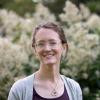
Contact Jennifer
Mail Code NS
Jennifer VanWyk
Cole Science Center 207
413.559.5323

Mail Code NS
Jennifer VanWyk
Cole Science Center 207
413.559.5323
Jennifer VanWyk is a community ecologist and entomologist. Her research addresses factors that govern community dynamics for native bee populations, including disease transmission, plant-pollinator networks, environmental stressors, and community response to human disturbances. VanWyk received her B.A. in biology with a focus in botany from Vassar College, and her M.S. and Ph.D. in ecology from the University of California, Davis.
VanWyk focuses on how plant and insect traits mediate species interactions, and how these interactions — both mutualistic and antagonistic — affect bee population dynamics and broader ecological outcomes. Her current work on tomatoes, heatwaves, and a protozoan bee parasite, addresses basic ecological questions in an applied agricultural context. VanWyk's work in pollination ecology and bee health has been funded by the National Science Foundation, the National Institute of Health, and the USDA-National Institute of Food and Agriculture.
Before joining the faculty at Hampshire College as an agroecologist, she taught ecology, entomology, environmental science, and experimental design at California State University, Chico, Mount Holyoke College, and UMass Amherst.
What can you learn from a walk in the woods? A forest is more than the trees -it holds stories of past inhabitants, the impacts of storms and fires, the movement of animals in space and time, and the ongoing changes that shape ecosystems. In this course, we will use the forests of Hampshire College as a living laboratory, exploring how natural and human histories are imprinted on the land. Through a combination of indoor and outdoor classroom experiences, students will engage in hands-on fieldwork, learn natural history, and discussions that deepen their understanding of forest dynamics. Students should be prepared to independently navigate unpaved and unmaintained forest trails for up to one hour per day, covering distances of up to one mile. Classes may take place outdoors in all weather conditions. Keywords:Natural history, biology, ecology
Bees originated approximately 120 million years ago, evolving alongside flowering plants and diversifying today into more than 20,000 species worldwide. This course uses bees (both managed and wild species) as a model to synthesize core concepts in biology. Through discussions on advanced topics in ecology and evolution, we will analyze the factors influencing bee population distributions, abundance, adaptations, and evolutionary relationships. By engaging deeply with a single taxonomic group, students will integrate knowledge across core biological disciplines-ecology, evolution, taxonomy, genetics, ecophysiology, behavior, conservation, disease, and agroecology. A central focus will be pollination ecology, including the politics, economics, and consequences of global pollinator declines, and the impacts of climate change on pollination networks. This upper-division course emphasizes scientific writing, peer review, experimental design, taxonomy, and student-led discussions of primary literature. Keywords:Entomology, Ecology, Biology, Taxonomy, Evolution
Ecology is the study of the relationship of organisms with their environment.In the first half of the semester, we will take a single-species approach to learning principles of ecology, covering topics such as ecophysiology, behavioral ecology, population ecology and evolution. We will then expand to a multispecies context to explore principles of community structure and functioning, species diversity patterns, and multi-trophic interactions. By the end of the course, students should be confident in synthesizing primary scientific literature, statistical and graphical comprehension of experimental results, and meaningfully engage in the peer review process. Keywords:Biology
Disease ecology is the ecological study of host-pathogen interactions within the context of their environment and evolution The effects of emerging wildlife diseases are global and profound. They can result in economic and agricultural impacts, declines in wildlife populations, ecological disturbance and even the loss of human lives. Disease dynamics are governed by species interactions and the abiotic environment. We will consider the synergistic effects of globalization, climate change, and agriculture on the spread of pathogens, and rely framework of One Health. This course will focus on both wildlife diseases and the ecological context of vector borne human pathogens including but not limited to the Sylvatic plague, West Nile Virus, Lyme disease, Avian Influenza and the newly emergent Rabbit hemorrhagic disease virus Keywords:climate change, health, biology
Experiments in Plant Ecology: The plant kingdom is vastly diverse, and this diversity structures ecosystem function and ecological interactions within communities. This laboratory component of the course will focus on hypothesis testing, designing and conducting of original ecological experiments. We will practice a range of ecology research methods including basic methods in data collection, soil analysis, quantifying biodiversity, animal behavior, forest ecology, and introductory data analysis. The ability to pose clear questions, state hypotheses, and design experiments to test these hypotheses is of fundamental importance for all learners, regardless of plans for a future career in science Keywords:botany, biology, research methods
The plant kingdom is vastly diverse, and this diversity structures ecosystem function and ecological interactions within communities. How do scientists study plants, and how does society influence the interpretation and communication of these scientific findings? We will cover topics in plant structure and function, ecology, and consider the intersection of sexism and pollen, xenophobia and invasion ecology, and sentience and botany. Our goal is to find wonder in the natural world, develop tools for observing natural history, and create a foundation for understanding plant ecology This course will rely on reading primary literature and conducting original experiments in the associated lab to learn about experimental design with an emphasis on hypothesis testing, methods of data collection, and introductory data analysis. The ability to pose clear questions, state hypotheses, and design experiments to test these hypotheses is of fundamental importance for all learners, regardless of plans for a future career in science Keywords:botany, biology, research methods